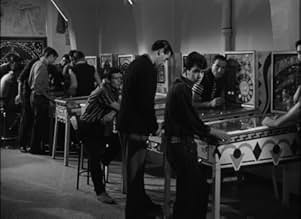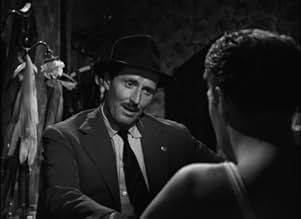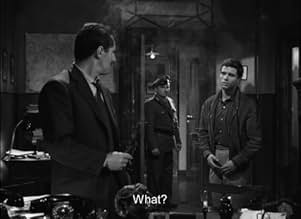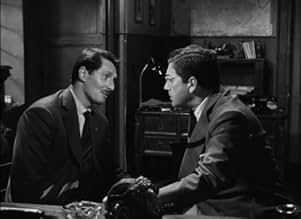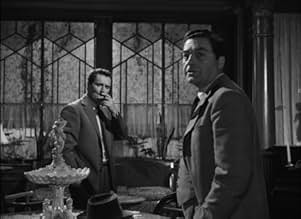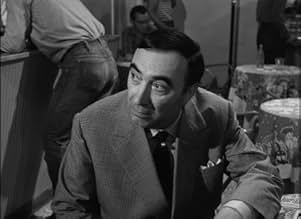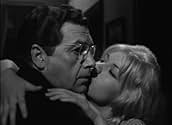VALUTAZIONE IMDb
7,4/10
1718
LA TUA VALUTAZIONE
Un investigatore di polizia e il suo team tentano di risolvere due crimini commessi a distanza di un giorno l'uno dall'altro nelle stanze degli appartamenti vicini.Un investigatore di polizia e il suo team tentano di risolvere due crimini commessi a distanza di un giorno l'uno dall'altro nelle stanze degli appartamenti vicini.Un investigatore di polizia e il suo team tentano di risolvere due crimini commessi a distanza di un giorno l'uno dall'altro nelle stanze degli appartamenti vicini.
- Regia
- Sceneggiatura
- Star
- Premi
- 5 vittorie e 3 candidature totali
Cristina Gaioni
- Virginia Caraci
- (as Cristina Gajoni)
Ildebrando Santafe
- Anzaloni
- (as Ildebrando Santafé)
Silla Bettini
- Il brigadiere Oreste
- (as Silla)
Recensioni in evidenza
Although Pietro Germi has the distinction of having directed the prototype of the genre known as Commedia all'Italiana, his non-comedic films are strongly influenced by the cinema of North America and here he has given us a first-rate 'police procedural'.
He and his excellent collaborators Alfredo Giannetti and Ennio de Concini have also faced the daunting task of adapting Carlo Emilio Gadda's 'That awful mess on Via Merulina' which is a panorama of life in Fascist Italy of the late 1920's. Granted, it involves a murder investigation but the author has not felt the need to tell us whodunnit!
The investigating detective in this loose, updated adaptation is played by Signor Germi who has once again opted to direct himself and has created a fascinating character. His skill with actors is legendary and he draws fine performances from Eleonora Rossi Drago, Franco Fabrizi, Claudio Gora, Claudia Cardinale, Nino Castelnuovo and of course the ubiquitous Saro Urzi. Signorina Cardinale is again 'dubbed' as her voice was considered too coarse for the roles she played. She is on the brink here of her greatest decade and we hear her own voice for the first time in Visconti's 'Il Gattopardo' in 1963.
The plot of this is convoluted to say the least but we are carried along by Germi's taut direction, sharp editing by Roberto Cinquini and well-drawn characterisations. Germi's regular cinematographer Leonarda Barboni and composer Carlo Rustichelli contribute immeasurably. Rustichelli's score is particularly full-blooded and he has composed a beautiful and haunting canzona sung by his daughter Alida, entitled 'Otherwise I'll die' which reflects the passionate relationship between the characters played by Cardinale and Castelnuovo. Viewers will no doubt recognise in Cardinale's frantic run after the police car a distinct echo of Anna Magnani's iconic dash in 'Rome, open City'.
Opinions differ as to whether Germi should be counted among the great Italian directors. I suppose it depends upon one's criteria. His most popular films of course have been his beautifully observed satirical comedies but from his directorial debut with the melodrama 'Il Testimone' he has never ceased to show a capacity to tell a story, engage our emotions and to get the very best from his actors. He is sorely in need of reappraisal.
He and his excellent collaborators Alfredo Giannetti and Ennio de Concini have also faced the daunting task of adapting Carlo Emilio Gadda's 'That awful mess on Via Merulina' which is a panorama of life in Fascist Italy of the late 1920's. Granted, it involves a murder investigation but the author has not felt the need to tell us whodunnit!
The investigating detective in this loose, updated adaptation is played by Signor Germi who has once again opted to direct himself and has created a fascinating character. His skill with actors is legendary and he draws fine performances from Eleonora Rossi Drago, Franco Fabrizi, Claudio Gora, Claudia Cardinale, Nino Castelnuovo and of course the ubiquitous Saro Urzi. Signorina Cardinale is again 'dubbed' as her voice was considered too coarse for the roles she played. She is on the brink here of her greatest decade and we hear her own voice for the first time in Visconti's 'Il Gattopardo' in 1963.
The plot of this is convoluted to say the least but we are carried along by Germi's taut direction, sharp editing by Roberto Cinquini and well-drawn characterisations. Germi's regular cinematographer Leonarda Barboni and composer Carlo Rustichelli contribute immeasurably. Rustichelli's score is particularly full-blooded and he has composed a beautiful and haunting canzona sung by his daughter Alida, entitled 'Otherwise I'll die' which reflects the passionate relationship between the characters played by Cardinale and Castelnuovo. Viewers will no doubt recognise in Cardinale's frantic run after the police car a distinct echo of Anna Magnani's iconic dash in 'Rome, open City'.
Opinions differ as to whether Germi should be counted among the great Italian directors. I suppose it depends upon one's criteria. His most popular films of course have been his beautifully observed satirical comedies but from his directorial debut with the melodrama 'Il Testimone' he has never ceased to show a capacity to tell a story, engage our emotions and to get the very best from his actors. He is sorely in need of reappraisal.
I've always felt that the post-war period of Italian and Japanese films contains the highest concentration of quality films, and I continue to discover new gems. Having finally recently seen Germi's 'Seduced and Abandoned', I've begun digging deeper into his filmography, and was not disappointed with 'Un Maledetto Imbroglio' ('The Facts of Murder').
At its heart 'The Facts of Murder' is a pretty straightforward police procedural, albeit a fairly complex and convoluted one for 1959. A break-in investigation soon becomes much more complicated and Inspector Ciccio Ingravallo, played perfectly by Germi himself, must dig through a series of shady, duplicitous characters to uncover the truth.
While it may not have the suspense or surprises of a Hitchcock or a giallo, what this film has is pure watchability, thanks to the attention to detail of a master director at the top of his game.
The casting is superb, with a slew of credible characters, including the great Saro Urzì as the cheeky Marshal Saro and Claudio Gora as the slimy, sweaty Remo Banducci. The acting is superb, particularly Germi, who is easily one of the best actors I've seen, just super-interesting and an absolute joy to watch. The camera work effortlessly carries us through the story, never bringing attention to itself. The script is utterly believable, real-life quirky dialogue peppered with lovely comic moments.
I mean, the level of craft in this film is astounding, and even though it wasn't the most original plot, I just loved every moment of this film. I'll be watching it again at some point, just to catch some of the brilliant quips and perfectly acted moments.
At its heart 'The Facts of Murder' is a pretty straightforward police procedural, albeit a fairly complex and convoluted one for 1959. A break-in investigation soon becomes much more complicated and Inspector Ciccio Ingravallo, played perfectly by Germi himself, must dig through a series of shady, duplicitous characters to uncover the truth.
While it may not have the suspense or surprises of a Hitchcock or a giallo, what this film has is pure watchability, thanks to the attention to detail of a master director at the top of his game.
The casting is superb, with a slew of credible characters, including the great Saro Urzì as the cheeky Marshal Saro and Claudio Gora as the slimy, sweaty Remo Banducci. The acting is superb, particularly Germi, who is easily one of the best actors I've seen, just super-interesting and an absolute joy to watch. The camera work effortlessly carries us through the story, never bringing attention to itself. The script is utterly believable, real-life quirky dialogue peppered with lovely comic moments.
I mean, the level of craft in this film is astounding, and even though it wasn't the most original plot, I just loved every moment of this film. I'll be watching it again at some point, just to catch some of the brilliant quips and perfectly acted moments.
Gadda's masterpiece is a blend of philosophical novel with mystery and murder, a baroque, caustic and ultimately poignant work exploring the myriad of interactive lives' endless and kaleidoscopic complexities - in other words, causes often interrelated that converge to the production of each individual effect. The book was rather flatenned here, but still it's Germi's most lasting and currently estimable movie, even better than The Road to Hope and Seduced and Abandoned.
Well worth seeing for many reasons: for the complex plot with many connections among those involved in a theft and a seemingly unrelated murder; for a look at Italy in 1959; for the good acting and fast cutting; and for the humor in the script.
How beautiful Claudia was, and what a cool role she plays! She is the most impressive of all, she doesn't have too many lines, but what a feeling, what a look. Then, Alida Chelli's very powerful song - "Sinnò Me Moro", stirs you deep into the heart. Excellent Pietro Germi, as a director and actor! All the others are excellent: Franco Fabrizi, Claudio Gora, Eleonora Rossi Drago, Nino Castelnuovo, Saro Urzi. 10 stars at least!
Lo sapevi?
- QuizThe murder takes place at 44 Piazza Farnese in Rome, Italy.
- BlooperThe cameraman is clearly visible on the left of the frame in the actual murder scene.
- Versioni alternativeA restored version has been released in 1999, edited by Vincenzo Verzini.
- ConnessioniFeatured in Cinema forever - Capolavori salvati (2001)
I più visti
Accedi per valutare e creare un elenco di titoli salvati per ottenere consigli personalizzati
- How long is The Facts of Murder?Powered by Alexa
Dettagli
- Tempo di esecuzione
- 1h 55min(115 min)
- Colore
- Proporzioni
- 1.37 : 1
Contribuisci a questa pagina
Suggerisci una modifica o aggiungi i contenuti mancanti

